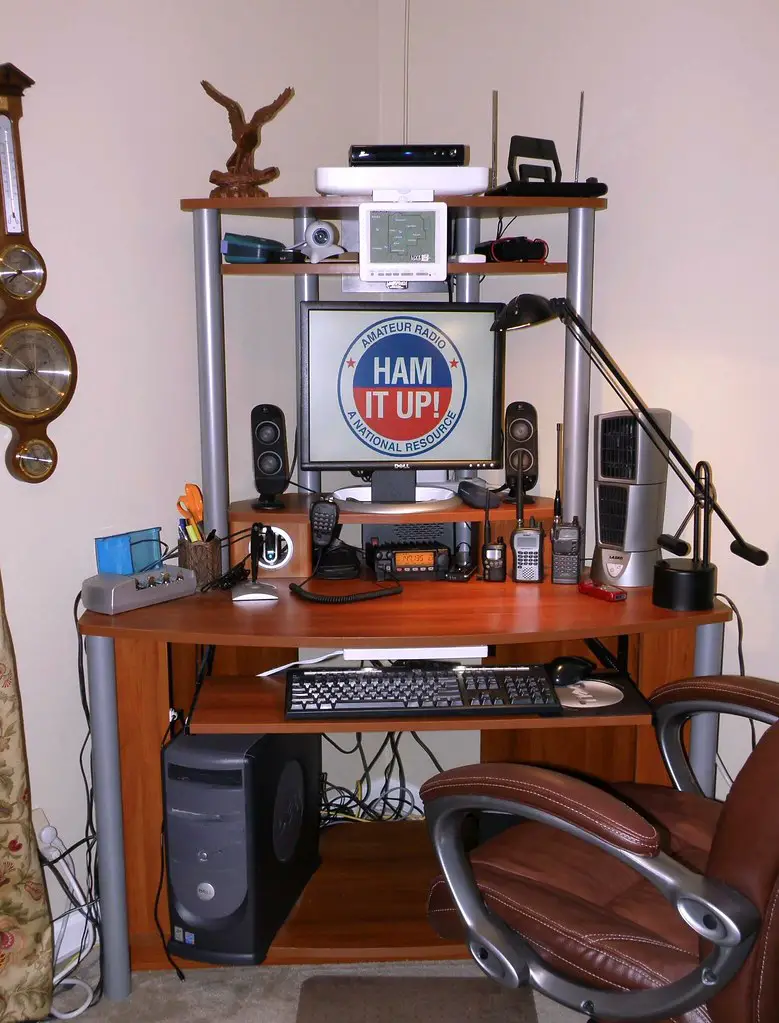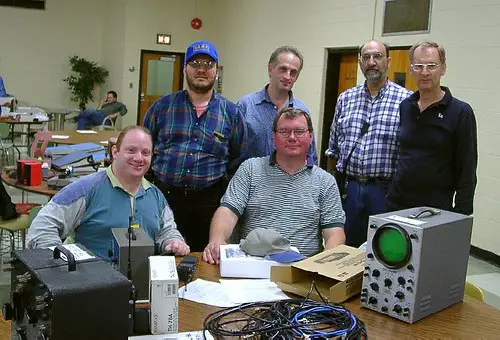To understand the world of ham radio and how to get licensed, delve into the introduction. Start by exploring the explanation of a ham radio license and the importance of having one. These sub-sections will shed light on the significance and necessity of obtaining a ham radio license.
Explanation of a ham radio license
A ham radio license is a permit giving individuals the okay to use amateur radios. You get it by passing an exam that tests your knowledge of radio theory, regulations, and how to use them. With the license, you get access to different frequencies and modes of communication.
Ham radio enthusiasts pursue this license to explore and take part in the great world of radio communication. It lets you connect with other enthusiasts, near and far, through voice transmission, digital modes, and even satellites. Plus, the ham radio community offers a lively platform to share knowledge, join contests, help with emergency communications during disasters, and do scientific experiments.
One great thing about getting a ham radio license is that you get a call sign. It’s like a unique identifier that tells everyone you are part of the ham radio community. The Federal Communications Commission (FCC) decides who gets a license in the US.
To get one, you must pass an exam that tests your understanding of concepts like electrical principles, antenna design, electromagnetic radiation, RF safety, and the proper use of radio equipment. This licensing system keeps things responsible and encourages knowledge.
Importance of having a ham radio license
Having a ham radio license is essential these days. It not only allows one to communicate in perilous and natural disaster situations but also opens up a world of exploration and connection. With a license, individuals can join a devoted community who share the same enthusiasm for the unique hobby.
No more limits imposed by typical communication channels–ham radio operators can reach out to fellow fanatics all around the globe, creating meaningful connections and friendships. This global network is a great platform for learning and exchanging knowledge about tech, electronics, and communication.
Additionally, having a license gives access to frequencies unavailable to the public, allowing transmissions over long distances easily.
Moreover, with a license, individuals can actively contribute in times of crisis. During emergencies or natural disasters when other ways of communication could be overloaded or impaired, ham radios become lifelines connecting affected communities with emergency services and relief organizations.
This capacity to offer aid when it’s most needed makes ham radio operators key players in disaster response efforts.
Besides its useful applications, obtaining a ham radio license offers numerous personal benefits as well. Learning about ham radios helps build technical skills and expand understanding of wireless communications. Also, this hobby offers immense pleasure from playing with equipment and experimenting with different operating modes.
Fun Fact: According to the American Radio Relay League (ARRL), there are over 700,000 licensed amateur radio operators in the US alone.
Requirements for obtaining a ham radio license

To obtain a ham radio license, meet the requirements for age restrictions, FCC licensing requirements, and utilize study materials and resources. Age restrictions outline the minimum age to apply, while FCC licensing requirements specify the necessary steps and documents to obtain the license. Study materials and resources aid in preparing for the license examination.
Age restrictions
If you want a ham radio license, certain age limits must be followed. Here are the age conditions for each license class:
- Class A – Under 16
- Class B – 16 up to 18
- Class C – Over 18
Remember: individuals under 16 need permission from parents to get a Class A license. And those under 18 must respect special rules when using it.
Tip: Know the age rules for each license class before applying for a ham radio license. That way, you can make sure you follow the rules.
FCC licensing requirements
Obtaining a ham radio license demands meeting the Federal Communications Commission’s (FCC) specific requirements. These rules detail the qualifications and procedures needed to run amateur radio equipment.
To understand these FCC requirements better, we can view them in a table:
| License Class | Minimum Age | Exam Required |
| Technician Class | None | Yes |
| General Class | 18 years old | Yes – Technician exam and General exam |
| Extra Class | 18 years old | Yes – Technician exam, General exam, and Extra exam |
This table outlines the various license classes, their minimum age restrictions, and the exams needed for a license. It is important to note that those with higher-class licenses have privileges over lower-class licenses.
Despite seeming plain, there are unique details to consider. For example, applicants must understand frequency allocations, operating privileges, and technical knowledge for each license class.
In one particular true story, Sarah showed her dedication to ham radio licensing. Despite initially struggling with technical concepts, she spent hours studying and attempting practice exams.
Finally, she passed the Technician exam with flying colours. Now, she has her ham radio license and loves connecting with fellow operators across the world.
To get a ham radio license, one must comply with FCC licensing requirements, such as age limits and examination criteria. Through hard work and determination, folks like Sarah can overcome these requirements and join the amateur radio operator community.
Study materials and resources
To get ready for a ham radio license, you need access to study materials & resources. These tools give you the knowledge & help you need to go through the licensing process. Here’s a look at some of these study materials and resources that can help you:
- Licensing manuals: In-depth guides with info for each ham radio licensing level.
- Online practice exams: Interactive platforms for testing your understanding of ham radio principles.
- Amateur radio clubs and forums: Communities to connect with experienced operators, ask for advice, & share insights.
- Web-based tutorials & videos: Visual content to simplify concepts & show practical parts of ham radio.
- Textbooks & educational courses: Learning materials to give a structured approach to radio expertise.
Using these resources with hands-on experience is a good idea. Try attending local club meetings, participating in field exercises, or talking to licensed operators. Real-life experiences can help a lot in learning.
For example, Dave, an aspiring ham operator, had a complex troubleshooting problem during his first communication attempt on his new ham radio. With only study materials, he asked for help from his local club. An experienced operator helped Dave problem-solve over the phone, giving useful practical info.
Studying for the ham radio license exam

To tackle studying for the ham radio license exam, equip yourself with an efficient plan. With an overview of the exam content, recommended study materials, and strategies for effective studying, you’ll have the tools to succeed. Dive into each sub-section to understand how to approach your exam preparation confidently.
Overview of the exam content
The ham radio license exam is an examination of one’s knowledge and abilities with amateur radio. It includes topics like rules, operating techniques, electronic principles, and radio wave characteristics.
The exam includes:
- Regulations: Knowing the regulations and rules set by bodies for amateur radio use.
- Procedures: Learning the proper practices to communicate with other ham operators.
- Electronics: Understanding the parts of radios and their functions.
- Wave Theory: Studying how radio waves travel, what frequency they are on, and how antennas are made.
Plus, candidates can be tested on emergency communication protocols and special modes like Morse code or satellite communications.
A cool story exists about a licensee who provided vital communication in a disaster when other forms of communication did not work. This shows how much dedication and commitment to ham radio is needed.
Studying for the ham radio license exam gives you not only technical knowledge but also the chance to help in emergencies with reliable communication.
Recommended study materials
Ready to ace that exam? Here are some great resources to help:
- The ARRL License Manual – all the info + practice Qs and explanations.
- Gordon West’s Technician Class Manual – easy-to-understand explanations and practice exercises.
- HamStudy.org – study guides, flashcards, and practice exams. Plus, a personalized learning experience.
- QRZ.com – study resources and forums for experienced operators to share their knowledge.
To enhance learning, consider amateur radio podcasts & joining local ham clubs. Set realistic goals & find time to study regularly. Bam! You’re all set!
Strategies for effective studying
Studying for the ham radio license exam? Here are some top strategies to ace it:
- Create a study schedule. Dedicated time makes learning easier.
- Use resources like guides, practice exams, and forums. They can provide great insights.
- Take notes, highlight info, and ask questions. It helps with retention.
- Connect with other aspiring hams. Collaboration can help you understand better.
- Take breaks to recharge your mind.
You must also be familiar with technical terms and regulations specific to ham radio operations. It can help.
In the past, successful hams have been super creative in their studying. They used mnemonic devices and catchy phrases for hard concepts. Others made games or interactive quizzes to reinforce their knowledge.
Use these techniques when preparing for the exam. Dedication and perseverance are key. Good luck!
Registering for the ham radio license exam

To successfully register for the ham radio license exam, streamline your process and save time by following these steps. Locate an exam session near you, gather the necessary documents, and pay any applicable fees. Each sub-section will guide you through these essential tasks, helping you navigate the registration process smoothly and efficiently.
Locating an exam session
To locate a ham radio license exam session, here are 3 steps to take:
- Visit the Federal Communications Commission website to find authorized test administrators in your area. Search for their list of upcoming exams.
- Contact nearby ham radio clubs or organizations. They often host exams and can give you info on upcoming dates and locations.
- Check online forums and social media groups about ham radio. People in these communities usually know of exam sessions happening in different places and can help you find one that fits your schedule.
Plus, remember to bring ID documents like a driver’s license or passport, plus any paperwork or fees needed from the exam administrator. By following these tips, you boost your chances of finding an exam session easily.
The FCC website has a list of authorized test administrators. Local clubs/orgs give you chances to network and get advice from experienced hams. Online forums and social media help you widen your search and connect with people who share the same interests. Be sure to prepare the required docs in advance for smooth registration.
Preparing necessary documents
To ace the ham radio license exam, you need to pay close attention to details when preparing all the necessary documents. Here are 3 easy steps to ensure a smooth registration process:
- Identify docs needed: Check the official website for exam requirements & what documents you need to gather (ID, proof of residency, any prior certificates/licenses).
- Gather & organize: Collect the documents in an organized manner. Make a checklist to make sure you have all the paperwork ready.
- Double-check accuracy: Carefully review each doc for accuracy & completeness. Check if forms are filled properly & supporting docs are clear & legible.
To further improve this process, start early to gather your docs, seek guidance if you have questions, and make copies of all submitted docs. Thorough preparation with accurate documentation is the key to getting the ham radio license quickly, and hassle-free!
Paying exam fees, if applicable
To get the ham radio license exam, you may need to pay a fee. Here are 4 points to remember when paying:
- Check with the licensing authority if there’s a fee.
- Find out the amount and payment methods.
- Pay the exam fee on time.
- Keep a copy of the payment receipt.
It’s worth noting that some may offer fee waivers or discounts. So, inquire about any available exemptions when paying.
Taking the ham radio license exam
To ace the ham radio license exam, equip yourself with all the necessary information. Understand the exam format and structure, receive valuable tips for the exam day, and prepare for what to expect during the exam. These sub-sections will provide you with a comprehensive solution to excel in obtaining your ham radio license.
Exam format and structure
The ham radio license exam follows a distinct format and structure. It features multiple-choice questions to test the candidate’s knowledge of radio communication. Here’s an overview:
The exam is divided into sections like regulations, operating procedures, electronics, and RF safety. Each section has a certain number of questions to be answered within a specific time limit. The questions are presented as multiple-choice and may include diagrams, graphs, or charts.
Here’s a breakdown:
| Category | Questions | Time |
|---|---|---|
| Regulations | 10 | 30 mins |
| Operating Procedures | 15 | 30 mins |
| Electronics | 20 | 45 mins |
| RF Safety | 5 | 15 mins |
Note: These numbers may vary depending on the license level. The exam may also include practical tests related to setting up and operating radio equipment.
Passing the exam gives you the chance to join a passionate community that loves communicating through radio waves. Sign up for the exam now to unlock endless possibilities in amateur radio!
Tips for the exam day
John was studying hard for his ham radio license exam. On the day of the test, he arrived early, brought all the necessary documents, and stayed focused. He read instructions carefully to understand the questions before selecting answers. John was nervous but managed to stay calm. Weeks later, he was delighted to learn he had passed with flying colours!
To help you succeed, here are some tips:
- Arrive Early – give yourself time to settle in and relax.
- Bring Necessary Documents – check the exam requirements beforehand.
- Stay Focused – block out any external noise or thoughts.
- Read Instructions Carefully – understand what is being asked.
It can also help to know common topics like frequency bands, antenna types, and signal propagation. Don’t rush through questions – take your time and read each one carefully. With proper preparation and following these tips, you can have a successful ham radio license exam day! Good luck!
What to expect during the exam
During the ham radio license exam, you can expect a professional assessment of your knowledge and understanding of radio principles and regulations. Questions will test your ability to use these concepts in real-world scenarios.
Questions may cover topics such as wave propagation, electrical principles, FCC regulations, antenna design, and emergency procedures. They’ll challenge your understanding of technical and practical aspects.
The exam may contain questions about proper operating procedures, band plans, station setup, and RF safety. It’s important to study materials and practice before taking the exam.
To succeed, you need a solid grasp of the subject, plus the ability to think critically and make informed decisions. The examiners want candidates who have both theoretical knowledge and practical application skills.
After the ham radio license exam
To navigate the post-exam process, equip yourself after the ham radio license exam with the info you need. This includes understanding the waiting period for exam results and the subsequent steps upon passing the exam. Additionally, discover valuable resources to connect with the vibrant ham radio community.
Waiting period for exam results
After you take the ham radio license exam, the next step is to wait for your results. This waiting period can differ depending on multiple things.
- If there were a lot of people in the exam, grading and processing results may take more time.
- The organisation responsible for administering the test also affects the waiting period. Different organisations have varied systems for grading and results processing.
- External factors like holidays or technical issues could also delay your results. Be patient while you wait!
During this time, you could improve your knowledge and skills in ham radio. Read books or join forums to stay connected with other enthusiasts and keep learning.
Pro Tip: Reach out to experienced ham radio operators who can provide guidance and mentorship as you begin your new journey in amateur radio communication.
Next steps upon passing the exam
Congrats on passing the ham radio license exam! Now, here’s a guide to help you transition into amateur radio:
- Get your call sign: Get your unique call sign to identify you when you’re operating.
- Set up your equipment: Get a transceiver, antenna, power supply, and other accessories. Set them up properly and you’ll be ready to communicate with other operators.
- Join a club or org: Connect with like-minded people in a club or organization. Learn from experienced operators and expand your knowledge of the field.
- Participate in activities: Take part in activities like contests, public service events, and nets. This will help you practice your skills and understand amateur radio better.
- Keep learning and exploring: Amateur radio has so many possibilities. Keep learning new techniques, experiment with different modes of communication, and explore the hobby.
There’s more to amateur radio than that. Get involved in emergency communications and disaster assistance, try out different antennas, and build your equipment – the possibilities are endless!
Here’s an inspiring story: A newly licensed operator decided to take part in an international contest shortly after passing the exam. Even though they were inexperienced, they took on the challenge. They made contact with people from multiple countries and even got a top position in their category. This experience not only boosted their confidence but also opened up new opportunities.
Keep in mind that passing the exam is just the start of an amazing journey. Embrace each step with enthusiasm, stay curious, and enjoy the wonders of amateur radio.
Resources for connecting with the ham radio community
Engaging with the ham radio community can be great for new license holders. Here are some tips to help you get started:
- Join online forums. Interact with other ham radio fans on websites like QRZ.com or eHam.net. You can ask questions, share stories, and make connections with experienced operators.
- Attend ham radio events. Look for local ham radio club meet-ups and field days in your area. At these events, you can meet experienced operators in person and connect with others in the community.
- Use social media. Follow ham radio-focused pages and groups on platforms like Facebook and Twitter. This will keep you in the know about the latest news, events, and conversations.
- Check out online communities. Websites like Reddit have dedicated ham radio forums. Joining these will give you access to many discussions, resources, and chances to link up with others.
- Volunteer at amateur radio organizations. Groups like ARES and RACES rely on volunteers. When you get involved, you can help with emergency communication and make friends in the ham radio community.
- Join local clubs. Research and join ham radio clubs in your area. These clubs often run regular meetings, workshops, and activities. You can learn from experienced operators and make connections.
For even more involvement in the ham radio community:
- Participate in contests and operating events organized by national organizations or clubs. These events foster friendly rivalry and interaction among operators.
- Post your own experiences on blogs or YouTube channels about amateur radio. Creating content can help educate others and let you link up with like-minded folk.
- Join special interest amateur radio groups that focus on specific topics such as satellite communications or digital modes. These groups let you have niche discussions and networks.
By following these tips and advice, you can easily make connections in the ham radio community, learn from experienced operators, and build lasting relationships in this interesting hobby.
Conclusion
Getting a ham radio license is a great achievement! It provides new communication opportunities, and licensees gain knowledge in operating radios, frequency knowledge, and regulations.
To start, study for and pass the license exam. Exam topics include radio procedures, technical aspects of radios, and regulations. Dedicate time to studying!
Then select the license class based on interests and goals. Each license class grants different privileges and access to special frequencies.
Also, join a local amateur radio club or community. This offers training, mentorship, and networking with other hams. Collaborations and new avenues can be explored!
Throughout history, ham radio has been a valuable resource. During disasters, they set up temporary networks and relay vital information. Their skills save lives.
Frequently Asked Questions
1. What is a ham radio license?
A ham radio license is an authorization granted by the government to individuals allowing them to operate amateur radio equipment. It is required by law in most countries to ensure that operators have the necessary knowledge and skills to use radio frequencies responsibly and effectively.
2. Why do I need a ham radio license?
A ham radio license is necessary to legally operate amateur radio equipment. It ensures that operators have a basic understanding of radio communication principles, technical regulations, and operating procedures. Licensing also helps promote safety and prevents interference with other radio users.
3. How do I obtain a ham radio license?
To get a ham radio license, you need to study for and pass a licensing exam administered by the government or a designated organization. The exam typically covers topics such as radio wave propagation, operating practices, regulations, and electronics. Once you pass the exam, you will receive your license.
4. What are the different ham radio license levels?
Ham radio licenses are usually categorized into different levels or classes, each allowing different privileges and operating conditions. The specific license classes may vary depending on the country, but they typically include Technician, General, and Extra classes. Higher license classes grant more frequency privileges and operating power.
5. How can I prepare for the ham radio license exam?
You can prepare for the ham radio license exam by studying relevant study guides and materials. There are numerous online resources, books, and study courses available that cover the required knowledge and practice exams. It is also helpful to join amateur radio clubs or communities where you can gain practical experience and guidance from experienced operators.
6. How long does a ham radio license last?
The duration of a ham radio license varies depending on the country. In many countries, a ham radio license is valid for a lifetime and does not require renewal. However, some countries may require licensees to renew their licenses periodically, usually every five to ten years.

